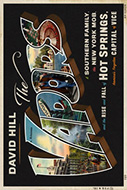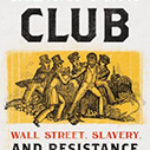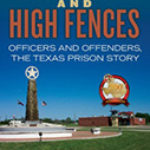The Vapors: A Southern Family, The New York Mob, And The Rise And Fall Of Hot Springs, America’s Forgotten Capital Of Vice

Author: David Hill
Publisher: New York: Farrar, Straus and Giroux, 2020. 400p.
Reviewer: Jim Finckenauer | February 2021
The Vapors in the title of this most enjoyable, interesting and readable book (perhaps reasons why it was chosen as a most notable book of 2020 by the NY Times), refers to a gambling casino in Hot Springs, Arkansas – the name derived from the fact that Hot Springs sits atop some thermal springs that bubble naturally hot water from deep in the earth. As the water springs from mountain cracks, it produces a kind of mist or vapor, and thus the name.
This book has an eclectic cast of characters, ranging from Hill’s own dysfunctional family, to mobsters, to gamblers of every color and stripe, and to politicians at multiple levels, briefly mentioning a future President of the United States named Clinton. The link or focal point connecting these various characters is gambling. And it is this core issue of gambling that leads this reviewer at least, to think about and to question what it is about gambling that makes it such a big deal? How big a deal? Well, in the case of Hot Springs, as Hill describes it, gambling proved to be a make-or-break issue for the survival of the city – and it indeed did just that — both make and then break it over the course of the city’s history.
Gambling seems to have been around since the beginning of time, and to certainly be among the oldest of human activities. It has seemed always, and continues to this day, to elicit diametrically opposed views. At one end of the spectrum are those who regard gambling as being evil and immoral. That perspective includes beliefs that gambling is seemingly motivated by the greed of the seven deadly sins and is the devil’s work, that it is trying to get something for nothing, that success at gambling is based purely on chance and not on merit and is thus less worthy, and that it is a kind of get-rich-quick scheme, etc. This is a perspective that has been historically reinforced by the kind of characters most often associated with gambling: gangsters, con artists, a variety of low lifes, prostitutes, corrupt politicians, losers, etc. An irony is that it is in part the effort to stamp out what is seen as a highly attractive and desirable activity by some, that leads to these latter sorry characters being the most likely ones to be associated with its continuation. It is just these sorts of individuals that populate David Hill’s discussion.
On the other side of the issue with respect to views of gambling are those who regard it as harmless entertainment, as being an exciting adventure engaged in by people acting of their own free will, as being one of those undertakings (and perhaps the only one) where a person could literally go from the bottom of the economic ladder to near the top overnight. Gambling does make or break fortunes for some, but especially for the cities and towns where the gambling establishments are located. And thus enter Hot Springs, Arkansas.
As the author describes it, Hot Springs was a kind of tourist attraction from its earliest beginnings. People came for the medicinal qualities of the springs, but over time looked to other activities and forms of entertainment. Hill writes that the guests “built Hot Springs into one of America’s first resort towns….one of the most unusual cities in the country, with an economy that revolved around tourism and employed some of the South’s most colorful characters” (p. 5).
Horse racing and casino gambling in Hot Springs dated back to the 1800s, but the history that Hill focuses on began in the 1930s. It was in 1935 that the author’s grandmother Hazel, then 16 years old, arrived in Hot Springs with her father Clyde Welch, who was a kind of traveling horse trainer. Welch came to Hot Springs because of the horse racing there. But because he traveled around the country to various racing sites, among other reasons, he decided he needed to leave Hazel somewhere. Consequently, it was in Hot Springs that Clyde Welch got his daughter hooked up with the Hill family, and their son Hollis. Hazel and Hollis fell in love and eventually married. The couple had three boys – one of whom, Jimmy, was the author’s father. But the other thing the couple unfortunately had was a dysfunctional relationship, largely a result of Hollis becoming an alcoholic, but also related to their various connections and employment with gambling and the gambling environment. David Hill describes his family in quite graphic and very personal terms. In reading this sad tale, this reviewer was reminded of a similar story, told in Hillbilly Elegy by J. D. Vance, of the grit required to survive in this kind of traumatic environment. Jimmy Hill, David’s father, seems to have been that kind of survivor.
Hazel and Hollis and their boys are the “southern family” of the book’s title, but then there is also the “New York mob.” Of the latter, the principal representative was a character named Owney Madden, who first came to Hot Springs in 1931. Hill describes Madden as not just a member of the criminal underworld, but “a proper boss…. [who] together with a small fraternity of former Prohibition bootleggers…helped maintain control of all the vice clubs, rackets, and political machines in New York City” (pp. 29-30). Madden was connected to the likes of Meyer Lansky, Bugsy Siegel, Lucky Luciano, Frank Costello, and Dutch Schultz among others; in other words, all the top kingpins of organized crime during that era. It was Lansky, according to Hill, who believing that gambling was the future of organized crime, tapped Madden to be the “mob’s ambassador” in Hot Springs. That timing was good for Madden because he had just been released on parole from Sing Sing – where he was serving a sentence for parole violation relating to an earlier sentence for murder – and because of the internecine warfare going on in the mob at that time that made NYC too hot for him.
Hill makes an interesting observation about the connection of organized crime and gambling that helps explain the Lansky opinion about it. Gambling is a so-called “victimless” crime; so-called because that depends in part on how one defines “victim.” Gambling had a product that was popular (at least among some), and, says Hill, “offered the gangsters the chance to build …warm—and dependent—relationships with their customers” (p. 36). Owney Madden had experience in running gambling and related entertainment venues, he had access to ready cash, he came across as an English gentleman (having been born in England), and he married the postmaster’s daughter, which helped make him a local instead of an outsider. Madden therefore helped build the foundation upon which gambling in Hot Springs flourished. The author captures very well the force of organized crime’s role in gambling, and especially the ambivalence about that role, as follows:
Gangsters ran every gambling joint, floating crap game, big-money poker game, and policy wheel in America since who knows how long. If you hired a dealer, they worked for a gangster at some point. If you hired a casino manager, they probably worked for a gangster. If you wanted to extend credit to your customers, you didn’t get that credit from the Bank of Arkansas.
But what makes someone a gangster? The gambling business was worth billions of dollars in America. Millions of regular folks placed bets on horses from barstools or played cards in the back of the Elks Lodge or played a number on a policy wheel. Was everyone who gambled in America outside of Nevada a hoodlum? (p. 215).
Just as with the prohibition of alcohol, the criminalization of gambling created a lucrative business opportunity for organized crime. But just because it was illegal, that meant that the mob could not go it alone in its gambling endeavors. Given that gambling became such a thriving and lucrative and open business in Hot Springs, one might have logically concluded that it was legit. Well, not exactly! Outside of Nevada — which had its own unique set of issues — because gambling was actually illegal, the cooperation of influential persons was required. How was that cooperation obtained? Enter the politicians.
Prime examples of the latter were Leo McLaughlin, the mayor of Hot Springs in the 1930s, and a municipal judge, Verne Ledgerwood. McLaughlin and Ledgerwood arranged for one W. S. Jacobs to become the boss gambler of Hot Springs, and Jacobs in turn delivered envelopes full of money to McLaughlin and Ledgerwood, among others, on a regular basis. This crew and other influential locals developed various cooperative arrangements with Owney Madden and some of his associates to maintain a lucrative gambling operation in Hot Springs for many years.
Mayor McLaughlin did exactly what he said he would do when he was running for mayor, namely tolerate illegal gambling, but, and this helps explain why the gambling was tolerated, make the gamblers pay for the improvements the city needed. This latter helps explain the seductiveness of gambling for local and state governments. It can become a source of revenue that would otherwise have to come from taxes. Many folks are happy to rationalize gambling via such forms as casinos and lotteries, as long as it helps to keep their taxes low. Again, this is illustrative of the love/hate ambiguity surrounding gambling.
As Hill details in his epilogue to the book, over a period of years gambling became more and more curtailed in Hot Springs for a number of reasons. There were the U.S. Senate investigations of organized crime; there was the competition from Las Vegas and Reno; and, there was the election of new public officials who not only opposed gambling, but actually took steps to eliminate it. Among the latter was one Winthrop Rockefeller, whose election as Arkansas governor in 1966, in Hill’s words, “spelled doom for the ragtag remains of the illegal gambling industry in Hot Springs” (p. 313).
David Hill has written an intriguing story that in its microcosmic detail will surely enable readers to better understand the gambling phenomenon. His book reads very much like a novel as opposed to an academic work, and its scope ranges from the historical and nationwide, down to the experiences of an individual family – his own. I highly recommend it!
Jim Finckenauer, Distinguished Professor Emeritus, Rutgers University, School of Criminal Justice


